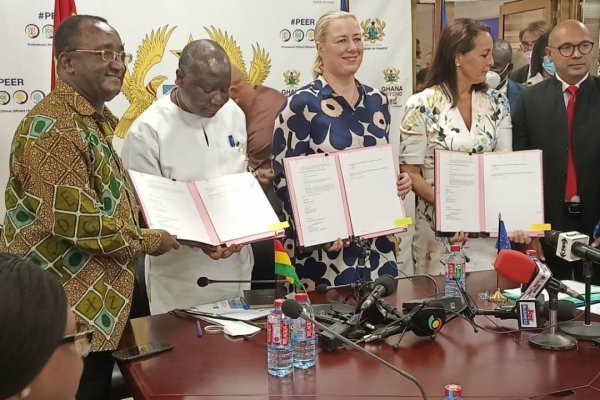Read in
The government, the Agence Française de Développement (AFD), and the European Union (EU) have signed €44.7 million Agriculture Water Management Project to support 6,000 small holder farmers in the Northern Region.
The project seeks to build and rehabilitate about 35 irrigation schemes in north-western Ghana.
To be implemented by the Ministry of Food and Agriculture (MoFA) and the Ghana Irrigation Development Authority (GIDA), the project aims at stimulating green and inclusive growth, reducing inequalities and improving Ghana’s food security.
The Minister of Finance, Mr Ken Ofori-Atta, signed for Ghana, while the AFD Country Director, Christophe Cottet, initialed for AFD.
The agreement was co-signed by the European Commissioner for International Partnerships, Jutta Urpilainen, and the French Ambassador to Ghana, Ms Anne-Sophie Ave’, and witnessed by the Minister of Food and Agriculture, Dr Owusu Afriyie Akoto, and the EU Ambassador to Ghana, Irchad Razaaly.
The grant would finance the rehabilitation and construction of 15 dams, 11 boreholes and nine pumping stations on the Black Volta River, and 1,300 hectares of irrigated perimeters.
It would enable farmers to move from rain-fed to irrigated agriculture, support the Water Users Associations (WUA) to run the irrigation scheme, and build GIDA’s capacity to supervise these schemes.
Ms Urpilainen said the EU was committed to supporting agriculture to spur economic development.
“The project we are signing today will support smallholder farmers to make their yields more predictable and increase their income. It is an ambitious and important investment which will boost the socio-economic development of regions in northern Ghana, essential for the development and stability of the country.”
For his part, Mr Ofori-Atta described the project as an important intervention.
He said the relationship between Ghana and the EU dated back to 1975 and that the cooperation was growing in leaps and bounds.
Mr Ofori-Atta told his EU counterpart that Ghana had vast land that could be utilised to increase agricultural production.
He said in spite of the interventions by the government and developing partners in the five regions of the north, poverty was still endemic, adding that the story could be changed for the better with more investment in agriculture.
Dr Akoto said the project would improve livelihood of the beneficiary communities, and urged the partner institutions to put their shoulders to the wheel to make the project successful.
The Ambassador of France to Ghana, Ms AVÉ, said “Investing in agriculture is investing in the future. Whatever the technologies, however drastically the world may change, humans will always need food.”
She said “this project will enable better jobs and revenues, environment friendly agriculture, all year round production, and ensure food provision for all”.
Ms Ave’ commended the government’s flagship programme, “The Planting for Food and Jobs” project, but advised investment in peace and security.



